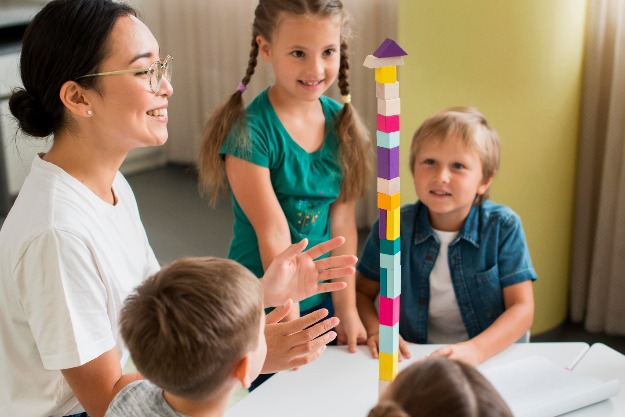Career Progression in Early Years Education
Working in early years education is a rewarding and fulfilling career path that allows you to shape the lives of young children during their formative years. From fostering a love of learning to supporting developmental milestones, early years practitioners play a crucial role in children's growth and development. Below, we outline the various positions in the early years sector, the key responsibilities of each role, and the opportunities for progression.
Level 2 Practitioner
What They Do: A Level 2 Practitioner typically works under the supervision of more senior staff in early years settings such as nurseries, preschools, and childcare centers. Their primary responsibilities include:
Supporting the delivery of educational programs and activities
Assisting with the care and supervision of children
Helping children develop basic skills through play and structured activities
Observing and recording children’s progress
Career Progression: After gaining experience and skills, a Level 2 Practitioner can progress to a Level 3 Practitioner role.
Level 3 Practitioner
What They Do: Level 3 Practitioners take on more responsibility and may lead small groups or activities. Their key duties include:
Planning and implementing educational programs tailored to individual children's needs
Assessing children's development and providing feedback to parents and guardians
Collaborating with other staff members to create a positive learning environment
Supporting children with special educational needs (SEN)
Career Progression: With further experience and professional development, Level 3 Practitioners can move into positions such as Room Leader or Third in Charge.

Room Leader
What They Do: As a Room Leader, you are responsible for managing a specific room or area within an early years setting. Your duties include:
Leading a team of practitioners and ensuring high standards of care and education
Developing and implementing activities that meet the needs of children in your room
Monitoring and assessing the progress of children and staff
Liaising with parents and caregivers to provide updates on their child's development
Career Progression: From the Room Leader position, you can advance to Third in Charge or Deputy Manager roles.
Third in Charge
What They Do: The Third in Charge supports the management team and assists in the overall operation of the early years setting. Key responsibilities include:
Supporting the Deputy Manager and Manager in daily operations
Helping to implement policies and procedures
Assisting in staff training and development
Taking on management duties in the absence of the Deputy Manager or Manager
Career Progression: With proven leadership skills and experience, you can advance to a Deputy Manager position.

Deputy Manager
What They Do: The Deputy Manager plays a significant role in the leadership and management of the early years setting. Responsibilities include:
Assisting the Manager in the day-to-day operations of the setting
Supporting staff development and performance management
Ensuring compliance with regulations and quality standards
Acting as the designated safeguarding lead (DSL)
Career Progression: With the necessary skills and experience, a Deputy Manager can progress to the role of Manager.
Manager
What They Do: As the Manager of an early years setting, you are responsible for the overall operation, including:
Leading and managing the staff team
Ensuring high-quality care and education for all children
Managing budgets and resources
Building relationships with parents, staff, and the local community

Additional Training and Specialisations
In the early years sector, additional training and qualifications can enhance your career progression and expertise. Some valuable training areas include:
Montessori Training: Focuses on child-led learning and fostering independence in young children, equipping practitioners with unique educational philosophies and methods.
Special Educational Needs (SEN) Training: Provides practitioners with the skills to support children with diverse learning needs, ensuring they receive appropriate care and education.
SENCO (Special Educational Needs Coordinator) Training: Prepares practitioners to take on a leadership role in supporting children with SEN, ensuring that their needs are met within the educational setting.
A career in early years education offers a structured path for progression, allowing you to develop your skills and take on increasing responsibilities. Whether you start as a Level 2 Practitioner or aim to become a Manager, there are ample opportunities to grow and make a positive impact on children's lives. By pursuing additional training, you can enhance your expertise and contribute even more to the field of early years education. Start your journey today and explore the possibilities that await you in this rewarding career!

